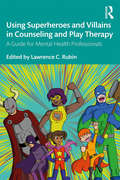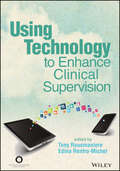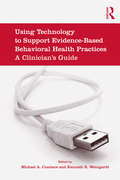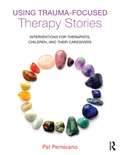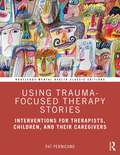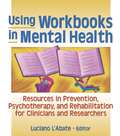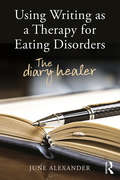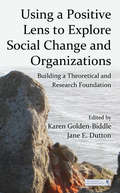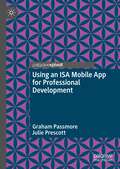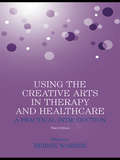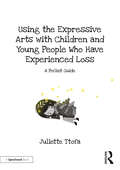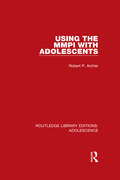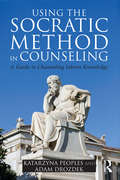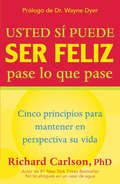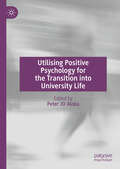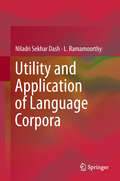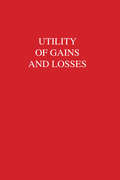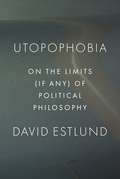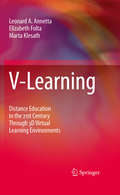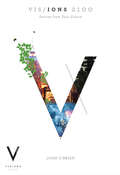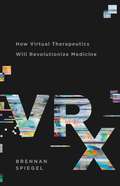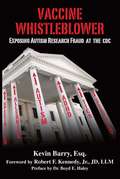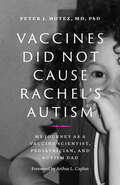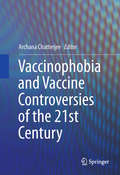- Table View
- List View
Using Superheroes and Villains in Counseling and Play Therapy: A Guide for Mental Health Professionals (Routledge Monographs In Classical Studies)
by Lawrence RubinThrough rich and research-grounded clinical applications, Using Superheroes and Villains in Counseling and Play Therapy explores creative techniques for integrating superhero stories and metaphors in clinical work with children, adolescents, adults and families. Each chapter draws on the latest empirically supported approaches and techniques to address a wide range of clinical challenges in individual, family and group settings. The chapters also explore important contextual issues of race, gender, culture, age and ethnicity and provide case studies and practical tips that clinicians can use to support clients on their healing journey.
Using Technology to Enhance Clinical Supervision
by Tony Rousmaniere Edina Renfro-MichelThis is the first comprehensive research and practice-based guide for understanding and assessing supervision technology and for using it to improve the breadth and depth of services offered to supervisees and clients. Written by supervisors, for supervisors, it examines the technology that is currently available and how and when to use it. Part I provides a thorough review of the technological, legal, ethical, cultural, accessibility, and security competencies that are the foundation for effectively integrating technology into clinical supervision. Part II presents applications of the most prominent and innovative uses of technology across the major domains in counseling, along with best practices for delivery. Each chapter in this section contains a literature review, concrete examples for use, case examples, and lessons learned. *Requests for digital versions from ACA can be found on www.wiley.com. *To request print copies, please visit the ACA website. *Reproduction requests for material from books published by ACA should be directed to permissions@counseling.org
Using Technology to Support Evidence-Based Behavioral Health Practices: A Clinician's Guide
by Michael A. Cucciare Kenneth R. WeingardtThe use of technology to provide cost-effective behavioral healthcare is emerging as a crucial aspect of treating a wide variety of behavioral health problems. However, many behavioral health providers lack the knowledge and skills necessary to effectively integrate technology-based behavioral tools into their practice. In Using Technology to Support Evidence-Based Behavioral Health Practices, the authors help providers implement technology-based behavioral health practices in various healthcare settings and with various mental health disorders. Divided into two parts, the text first addresses specific disorders or problem areas, then presents issues concerning implementation and evaluating such tools in clinical practice and important ethical issues to consider when doing so.
Using Trauma-Focused Therapy Stories: Interventions for Therapists, Children, and Their Caregivers
by Pat PernicanoUsing Trauma-Focused Therapy Stories is a groundbreaking treatment resource for trauma-informed therapists who work with abused and neglected children ages nine years and older as well as their caregivers. The therapy stories are perfect accompaniments to evidence-based treatment approaches and provide the foundation for psychoeducation and intervention with the older elementary-aged child or early pre-teen. Therapists will also benefit from the inclusion of thorough guides for children and caregivers, which illustrate trauma and developmental concepts in easy-to-understand terms. The psychoeducational material in the guides, written at a third- to fourth-grade reading level, may be used within any trauma-informed therapy model in the therapy office or sent-home for follow-up. Each therapy story illustrates trauma concepts, guides trauma narrative and cognitive restructuring work, and illuminates caregiver blind spots; the caregiver stories target issues that often become barriers to family trauma recovery. No therapist who works with young trauma survivors will want to be without this book, and school-based professionals, social workers, psychologists and others committed to working with traumatized children will find the book chock-full of game-changing ideas for their practice.
Using Trauma-Focused Therapy Stories: Interventions for Therapists, Children, and Their Caregivers (Routledge Mental Health Classic Editions)
by Pat PernicanoUsing Trauma-Focused Therapy Stories is a groundbreaking treatment resource for trauma-informed therapists who work with abused and neglected children ages nine years and older as well as their caregivers. The classic edition includes a new preface from the author reflecting on changes in the field since the book’s initial publication. The therapy stories are perfect accompaniments to evidence-based treatment approaches and provide the foundation for psychoeducation and intervention with the older elementary-aged child or early pre-teen. Therapists will also benefit from the inclusion of thorough guides for children and caregivers, which illustrate trauma and developmental concepts in easy-to-understand terms. The psychoeducational material in the guides, written at a third- to fourth-grade reading level, may be used within any trauma-informed therapy model in the therapy office or sent-home for follow-up. Each therapy story illustrates trauma concepts, guides trauma narrative and cognitive restructuring work, and illuminates caregiver blind spots; the caregiver stories target issues that often become barriers to family trauma recovery. No therapist who works with young trauma survivors will want to be without this book, and school-based professionals, social workers, psychologists and others committed to working with traumatized children will find the book chock-full of game-changing ideas for their practice.
Using Workbooks in Mental Health: Resources in Prevention, Psychotherapy, and Rehabilitation for Clinicians and Researchers
by Luciano L'AbateThe use of workbooks in therapy might represent one of the biggest breakthroughs that has occurred in decades. Using Workbooks in Mental Health: Resources in Prevention, Psychotherapy, and Rehabilitation for Clinicians and Researchers examines the effectiveness of mental health workbooks designed to address problems ranging from dementia and depression to addiction, spousal abuse, eating disorders, and more. Compiled by Dr. Luciano L&’Abate, a leading authority on mental health workbooks, this resource will help clinicians and researchers become aware of the supportive evidence for the use of workbooks. Using Workbooks in Mental Health examines workbooks designed to specifically help: clients affected by dementia or depression abused women gambling addicts women who have substance-abuse addictions incarcerated felons couples preparing for marriage children with school refusal disorder and more! An essential reference for mental health professionals, graduate students, administrators, and researchers, Using Workbooks in Mental Health also explores the role of workbooks in psychological intervention over the past decade. Although workbooks are not yet part of the mainstream of psychological intervention, they are growing in popularity as their many advantages are recognized. They are easy to use by almost any client, they are cost-effective to both therapist and client in terms of money and time, they provide therapists with written assignments to use as homework for individuals, couples, and families, and they can be used in any setting, especially in computer-assisted offline or online interventions. In addition, this book shows how workbooks can be used to administer therapy to previously unreachable clients such as: people who are reluctant to talk to an authoritative figure or a stranger people who cannot afford face-to-face treatments incarcerated offenders who have not been helped by talk therapies Internet users who are searching for help via computer rather than in person
Using Writing as a Therapy for Eating Disorders: The diary healer
by June AlexanderUsing Writing as a Therapy for Eating Disorders: The diary healer uses a unique combination of evidence-based research and raw diary excerpts to explain the pitfalls and benefits of diary writing during recovery from an eating disorder. In a time when diary writing remains a largely untapped resource in the health care professions, June Alexander sets out to correct this imbalance, explaining how the diary can inspire, heal and liberate, provide a learning tool for others and help us to understand and cope with life challenges. The book focuses on the power of diary writing, which may serve as a survival tool but become an unintended foe. With guidance, patients who struggle with face-to-face therapy are able to reveal their thoughts through writing and construct a strong sense of self. The effects of family background and the environment are explored, and the therapeutic value of sharing diaries, to better understand illness symptoms and behaviours, is discussed. Using Writing as a Therapy for Eating Disorders will be of interest to those who have recovered or are recovering from eating disorders or any mental illness, as well as therapists, clinicians and others working in the medical and healthcare professions.
Using a Positive Lens to Explore Social Change and Organizations: Building a Theoretical and Research Foundation (Organization and Management Series)
by Jane E. Dutton Karen Golden-BiddleHow can application of a positive lens to understanding social change and organizations enrich and elaborate theory and practice? This is the core question that inspired this book. It is a question that brought together a diverse and talented group of researchers interested in change and organizations in different problem domains (sustainability, healthcare, and poverty alleviation). The contributors to this book bring different theoretical lenses to the question of social change and organizations. Some are anchored in more macro accounts of how and why social change processes occur, while others approach the question from a more psychological or social psychological perspective. Many of the chapters in the book travel across levels of analyses, making their accounts of social change good examples of multi-level theorizing. Some scholars are practiced and immersed in thinking about organizational phenomena through a positive lens; for others it was a total adventure in trying on a new set of glasses. However, connecting all contributing authors was an excitement and willingness to explore new insights and new angles on how to explain and cultivate social change within or across organizations. This edited volume will be of interest to an international community who seek to understand how organizations and people can generate positive outcomes for society. Students and researchers in organizational behavior, management, positive psychology, leadership and corporate responsibility will find this book of interest.
Using an ISA Mobile App for Professional Development
by Graham Passmore Julie PrescottBuilding on our prior ISA-based Palgrave pivot, the aims of the book are twofold. One, to showcase a newly developed App as a tool in the use of Identity Structure Analysis (ISA) for researchers interested in identity. Second, the book will focus on the use, of a counselling supervision ISA instrument in order to highlight the benefits of ISA for professional development (PD) for any profession. The idea is that any researcher interested in professional and or personal development would be able to use the proposed book to aid them in either a supervision style process of development or the more standard one-to-one annual/biannual approach to PD. Through using ISA in PD, the book and its attendant analyses will encourage discussion, facilitate openness, and highlight potential issues that may lead to burnout, mental health issues, leaving a profession or additional risks. That is, the book will be oriented to informing researchers as to the potential ISA, the App, and the supervision instrument hold for directing PD.
Using the Creative Arts in Therapy and Healthcare: A Practical Introduction
by Bernie WarrenUsing the Creative Arts in Therapy and Healthcare provides a practical introduction to the uses of arts and other creative processes to promote health and encourage healing. This latest edition includes newly edited chapters from the original and second edition covering the therapeutic use of dance, drama, folklore and ritual, story telling and the visual arts. Information on guidelines, preparations and practical hints for leaders and facilitators has also been updated. New chapters provide an international perspective in the field of the arts and healthcare, and show how the artist can alleviate distress for patients through art, music and drama. Illustrated throughout with ideas and examples of how the arts can be used in a range of healthcare settings, this book will be essential reading for creative arts therapists and healthcare professionals throughout the world.
Using the Expressive Arts with Children and Young People Who Have Experienced Loss: A Pocket Guide (Supporting Children and Young People Who Experience Loss)
by Juliette TtofaThis guidebook has been created to be used alongside the storybook, The Girl Who Lost the Light in Her Eyes. Using a relational approach, it explores the themes of the story and offers guidance to the adult as they use expressive arts to give the child or young person a creative outlet for their emotions. The gentle guidance offered makes this an ideal tool for non-specialists working with children experiencing loss or bereavement. It guides the adult to respond appropriately and sensitively to the grief of the child, whilst helping them journey through the grieving process. This book must be used alongside the illustrated storybook, The Girl Who Lost the Light in Her Eyes. Both books are available to purchase as a set, Supporting Children and Young People Who Experience Loss. The full set includes: • The Girl Who Lost the Light in Her Eyes, a colourfully illustrated and sensitively written storybook, designed to encourage conversation and support emotional literacy. • Using the Expressive Arts with Children and Young People Who Experience Loss, a supporting guidebook that explores a relational approach and promotes creative expression as a way through loss or bereavement. Perfectly crafted to spark communication around a difficult topic, this is an invaluable tool for practitioners, educators, parents, and anybody else looking to support a child or young person through loss or bereavement.
Using the MMPI with Adolescents (Routledge Library Editions: Adolescence #1)
by Robert ArcherOriginally published in 1987, the objective of this volume was to provide a clear and comprehensive review of the literature in the area of adolescents and the MMPI based on the research studies that had occurred in the previous 40 years. It was written to provide the reader with an appreciation and understanding of the research that had occurred, as well as to highlight areas in which crucial research had essentially not occurred, such as systematic and ongoing investigations of the accuracy of clinical descriptive statements for adolescents based on adolescent and adult correlate data. The volume also attempts to provide a developmental perspective through which to understand adolescent response patterns as well as a clear discussion of the empirical implications of using adult and adolescent norm conversions for adolescent respondents. A series of direct, concrete recommendations are offered for the scoring and interpretation of adolescent response patterns, along with the empirical foundations on which these suggestions are based. Finally, this book provides a description of norm development projects at the time and future research directions.
Using the Socratic Method in Counseling: A Guide to Channeling Inborn Knowledge
by Katarzyna Peoples Adam DrozdekUsing the Socratic Method in Counseling shows counselors how to use the Socratic method to help clients solve life problems using knowledge they may not realize they have. Coauthored by two experts from the fields of philosophy and counseling, the book presents theory and techniques that give counselors a client-centered and contextually bound method for better addressing issues of ethnicities, genders, cultures. Readers will find that Using the Socratic Method in Counseling is a thorough and useful text on a new theoretical orientation grounded in ancient philosophy.
Usted sí puede ser feliz pase lo que pase
by Richard Carlson?En esta versión revisada, el renombrado autor y consultor Dr. Richard Carlson, conocido nacionalmente por su trabajo con el manejo del estrés, nos revela un importantísimo adelanto en la psicología humana. La mayoría de la gente cree que la felicidad depende de las circunstancias exteriores, y que resolviendo nuestros problemas, mejorando nuestras relaciones y teniendo éxito, podremos encontrar la felicidad. Pero el Dr. Carlson demuestra claramente que la felicidad no tiene que ver con fuerzas fuera de nuestro control -- y que, de hecho, la felicidad es nuestro estado natural. ?Con esta guía sencilla y práctica, el Dr. Carlson nos enseña cómo ser felices ahora, antes de intentar la solución de nuestros problemas. Si entendemos los cinco principios -- pensamiento, estados de ánimo, realidades separadas, sentimientos, y el momento presente -- descubrimos un nuevo modo de ser que no reprime las emociones naturales ni tampoco permite que nos abrumen nuestros pensamientos y sentimientos. Usted sí puede ser feliz pase lo que pase es una guía que lleva cuidadosamente al lector por entre los retos de la vida, y a lo largo del camino nos va restaurando con la alegría de la vida.
Utilising Positive Psychology for the Transition into University Life
by Peter Jo AlokaThis book uses a positive psychology approach to the assist freshmen/first year students in the transition to University life. New University are faced with varied adjustment challenges on the transition from secondary school to higher education because there are vast differences between secondary schooling and university environment including learning and teaching styles, expectation to manage themselves. Positive psychology involves reflecting on one’s weaknesses and strengths and how to capitalize on the latter and so, using case studies from South African universities, this book details how knowledge of ones strengths and weaknesses can help new University students engage in the learning process. As such, this pioneering work will be of interest to students, educators and therapy practitioners alike.
Utility and Application of Language Corpora
by Niladri Sekhar Dash L. RamamoorthyThis book discusses some of the basic issues relating to corpus generation and the methods normally used to generate a corpus. Since corpus-related research goes beyond corpus generation, the book also addresses other major topics connected with the use and application of language corpora, namely, corpus readiness in the context of corpus sanitation and pre-editing of corpus texts; the application of statistical methods; and various text processing techniques. Importantly, it explores how corpora can be used as a primary or secondary resource in English language teaching, in creating dictionaries, in word sense disambiguation, in various language technologies, and in other branches of linguistics. Lastly, the book sheds light on the status quo of corpus generation in Indian languages and identifies current and future needs.Discussing various technical issues in the field in a lucid manner, providing extensive new diagrams and charts for easy comprehension, and using simplified English, the book is an ideal resource for non-native English readers. Written by academics with many years of experience teaching and researching corpus linguistics, its focus on Indian languages and on English corpora makes it applicable to graduate and postgraduate students of applied linguistics, computational linguistics and language processing in South Asia and across countries where English is spoken as a first or second language.
Utility of Gains and Losses: Measurement-Theoretical and Experimental Approaches (Scientific Psychology Series)
by R. Duncan LuceThis new monograph presents Dr. Luce's current understanding of the behavioral properties people exhibit (or should exhibit) when they make selections among alternatives and how these properties lead to numerical representations of those preferences. It summarizes, and places in historical perspective, the research Dr. Luce has done on utility theory for over 10 years. Included are axiomatic theoretical formulations, experiments designed to test individual assumptions, and analyses of the fit to bodies of data of numerical representations derived from the theory.
Utopiates
by H. Lark HallLSD belongs to the class of drugs that, taken orally, can produce dramatic psychological experiences. There appears to be a wide range of response to LSD. Commonly there are reports of sensory changes, extreme variations in strong emotions, new perspectives about oneself, changed views of-and feelings toward-other people, changes from prior chronic situations, shifts in interest, and new integrative experiences which may be delusional or mystically religious.The contributors to this volume, which was first published in 1965, accent the culture that embraces LSD. They marshal evidence that the effects of any drug tend to be in keeping with the values of the culture or subculture in which it is used, or if the user's wish is to express rebellion or dissidence, the effect will stand in opposition to prevailing values. The same substance has different effects in different cultures; and the same effects may be achieved with different substances. In the past, alcohol was hailed in much the same way as LSD. There was even a time when coffee was brought under the same kind of proscription that today holds for opiates.Such conflicts in values and morals continue with a new generation of drugs, which makes this volume especially relevant. What could be done was an open issue at the time this book was first published. The contributors encourage citizens, scientists, physicians, mystics, ministers, lawmakers and lawmen, drug users and abstainers, to learn and to think more about the phenomena of drug use and to develop plans for social action. This volume stresses the need to develop a policy regarding the handling of classes of drugs and drug users. Although LSD has fallen in favor as a drug of choice for those interested in experimentation, the issues raised in this volume remain with us.
Utopophobia: On the Limits (If Any) of Political Philosophy
by David EstlundA leading political theorist’s groundbreaking defense of ideal conceptions of justice in political philosophyThroughout the history of political philosophy and politics, there has been continual debate about the roles of idealism versus realism. For contemporary political philosophy, this debate manifests in notions of ideal theory versus nonideal theory. Nonideal thinkers shift their focus from theorizing about full social justice, asking instead which feasible institutional and political changes would make a society more just. Ideal thinkers, on the other hand, question whether full justice is a standard that any society is likely ever to satisfy. And, if social justice is unrealistic, are attempts to understand it without value or importance, and merely utopian?Utopophobia argues against thinking that justice must be realistic, or that understanding justice is only valuable if it can be realized. David Estlund does not offer a particular theory of justice, nor does he assert that justice is indeed unrealizable—only that it could be, and this possibility upsets common ways of proceeding in political thought. Estlund engages critically with important strands in traditional and contemporary political philosophy that assume a sound theory of justice has the overriding, defining task of contributing practical guidance toward greater social justice. Along the way, he counters several tempting perspectives, including the view that inquiry in political philosophy could have significant value only as a guide to practical political action, and that understanding true justice would necessarily have practical value, at least as an ideal arrangement to be approximated.Demonstrating that unrealistic standards of justice can be both sound and valuable to understand, Utopophobia stands as a trenchant defense of ideal theory in political philosophy.
V-Learning
by Leonard A. Annetta Elizabeth Folta Marta KlesathEqually grounded in the research and the practical applications developed by the authors over a number of years, this book shows how virtual learning environments could represent the future of higher education. As academics begin to use environments such as Second Life to reach a broader student audience, this volume offers the distance-learning community (administrators, faculty, and students) a different, yet successful, approach to delivering content over the Internet through 3D virtual learning environments that have the potential to transform higher education. Covering a broad spectrum of frameworks, from commercial multiplayer video games to online learning, the book shows just how powerful these environments can be in the arena of education, and concludes that data-driven practice will ensure almost universal take-up, even among those currently unwilling to use V-learning. The authors provide numerous practical examples of distance learning in its current state of development, as well as making informed predictions about how future environments might evolve. This much-needed book is right at the cutting edge of its subject, and comes at a time when research in both educational gaming and distance learning are converging.
VISIONS 2100: Stories from Your Future
by John K. O'BrienStories from Your Future The complex issue of climate change is one that our race is struggling to address. The solutions are not beyond us in any way. Technological solutions exist, scientific knowledge is plentiful, the world can afford the transition but still significant action eludes us. Rational arguments for rapid action abound. We do not need any more of those. What is needed is a different way of communicating that inspires and attracts the widest possible group of humans towards wanting to travel on this same journey. As part of the VISIONS 2100 Project, this book tells of the power of Visions and invites the reader to create and share their own vision of a better world. Only by starting conversations of the future will we manage to build the world that we really want. The book balances worries about catastrophe with social and environmental improvements by referencing psychology, management thought, case studies and personal anecdotes. In also references the parallels between the world's journey and coping with the chronic illness of the author's wife. The book is framed around eighty short visions by some of the world's leading environmental thinkers including Mary Robinson, Christiana Figueres, Bill McKibben, Connie Hedegaard, Yvo de Boer and many others. Having a vision of a better world is likely to result in the world being better. 'Poverty is eradicated. Every child goes to school regardless of sex, race, religion or place of birth. Every woman enjoys equality with every man. Every household has access to energy. In 2100, the world is just.' Mary Robinson, Special Envoy on Climate Change, United Nations'Opportunity from 2100 forward is unimaginably vast and incredibly varied.' Christiana Figueres, Executive Secretary, UNFCCC 'Timing is everything, and it hurts to think we blew it.' Bill McKibben, 350.orgThe future is a beautiful, if challenging, partner. Your choice is whether you take the risk in having a first date or whether you are happy to accept a life of regret.www.visions2100.com
VRx: How Virtual Therapeutics Will Revolutionize Medicine
by Brennan SpiegelA leading doctor unveils the groundbreaking potential of virtual medicine.Brennan Spiegel has spent years studying the medical power of the mind, and in VRx he reveals a revolutionary new kind of care: virtual medicine. It offers the possibility of treating illnesses without solely relying on intrusive surgeries or addictive opioids.Virtual medicine works by convincing your body that it's somewhere, or something, it isn't. It's affordable, widely available, and has already proved effective against everything from burn injuries to stroke to PTSD. Spiegel shows how a simple VR headset lets a patient with schizophrenia confront the demon in his head, how dementia patients regain function in a life-size virtual town, and how vivid simulations of patients' experiences are making doctors more empathic.VRx is a revelatory account of the connection between our bodies and ourselves. In an age of overmedication and depersonalized care, it offers no less than a new way to heal.
Vaccine Whistleblower: Exposing Autism Research Fraud at the CDC
by Kevin Barry Robert Kennedy Jr. Dr Boyd HaleyA Firsthand Account from a CDC Insider on the Link between Vaccines and Autism Vaccine Whistleblower is a gripping account of four legally recorded phone conversations between Dr. Brian Hooker, a scientist investigating autism and vaccine research, and Dr. William Thompson, a senior scientist in the vaccine safety division at the Centers for Disease Control and Prevention (CDC). Thompson, who is still employed at the CDC under protection of the federal Whistleblower Protection Act, discloses a pattern of data manipulation, fraud, and corruption at the highest levels of the CDC, the federal agency in charge of protecting the health of Americans. Thompson states, "Senior people just do completely unethical, vile things and no one holds them accountable. ” This book nullifies the government’s claims that "vaccines are safe and effective,” and reveals that the government rigged research to cover up the link between vaccines and autism. Scientific truth and the health of American children have been compromised to protect the vaccine program and the pharmaceutical industry. The financial cost of the CDC’s corruption is staggering. The human cost is incalculable. Vaccine Whistleblower provides context to the implications of Thompson’s revelations and directs the reader to political action.
Vaccines Did Not Cause Rachel's Autism: My Journey as a Vaccine Scientist, Pediatrician, and Autism Dad
by Peter J. HotezInternationally renowned medical scientist, frequent media contributor, and autism dad Dr. Peter J. Hotez explains why vaccines do not cause autism.In 1994, Peter J. Hotez's nineteen-month-old daughter, Rachel, was diagnosed with autism. Dr. Hotez, a pediatrician-scientist who develops vaccines for neglected tropical diseases affecting the world's poorest people, became troubled by the decades-long rise of the influential anti-vaccine community and its inescapable narrative around childhood vaccines and autism. In Vaccines Did Not Cause Rachel's Autism, Hotez draws on his experiences as a pediatrician, vaccine scientist, and father of an autistic child. Outlining the arguments on both sides of the debate, he examines the science that refutes the concerns of the anti-vaccine movement, debunks current conspiracy theories alleging a cover-up by the Centers for Disease Control and Prevention, and critiques the scientific community's failure to effectively communicate the facts about vaccines and autism to the general public, all while sharing his very personal story of raising a now-adult daughter with autism.A uniquely authoritative account, this important book persuasively provides evidence for the genetic basis of autism and illustrates how the neurodevelopmental pathways of autism are under way before birth. Dr. Hotez reminds readers of the many victories of vaccines over disease while warning about the growing dangers of the anti-vaccine movement, especially in the United States and Europe. Now, with the anti-vaccine movement reenergized in our COVID-19 era, this book is especially timely. Vaccines Did Not Cause Rachel's Autism is a must-read for parent groups, child advocates, teachers, health-care providers, government policymakers, health and science policy experts, and anyone caring for a family member or friend with autism."When Peter Hotez—an erudite, highly trained scientist who is a true hero for his work in saving the world's poor and downtrodden—shares his knowledge and clinical insights along with his parental experience, when his beliefs in the value of what he does are put to the test of a life guiding his own child's challenges, then you must pay attention. You should. This book brings to an end the link between autism and vaccination."—from the foreword by Arthur L. Caplan, NYU School of Medicine
Vaccinophobia and Vaccine Controversies of the 21st Century
by Archana ChatterjeeVaccinophobia and Vaccine Controversies of the 21st Century Archana Chatterjee, editor Once hailed as a medical miracle, vaccination has come under attack from multiple fronts, including occasionally from within medicine. And while the rates of adverse reactions remain low, suggestions that vaccines can cause serious illness (and even death) are inspiring parents to refuse routine immunizations for their children--ironically, exposing them and others to potentially serious illness. Vaccinophobia and Vaccine Controversies of the 21st Century explains clearly how this state of affairs came into being, why it persists, and how healthcare professionals can best respond. Current findings review answers to bedrock questions about known adverse events, what vaccine additives are used for, and real and perceived risks involved in immunization. Perspectives representing pediatricians, family practitioners, nurses, parents, pharmacy professionals, the CDC, and the public health community help the reader sort out legitimate from irrational concerns. In-depth analyses discuss the possibility of links with asthma, cancer, Guillain-Barre syndrome, SIDS, and, of course, autism. Included in the coverage: Communicating vaccine risks and benefitsThe vaccine misinformation landscape in family medicinePerceived risks from live viral vaccinesThe media's role in vaccine misinformationAutoimmunity, allergies, asthma, and a relationship to vaccinesVaccines and autism: the controversy that won't go awayThe conundrums described here are pertinent to practitioners in pediatrics, family medicine, primary care, and nursing to help families with informed decision making. In addition, Vaccinophobia and Vaccine Controversies of the 21st Century should be read by trainees and researchers in child development and maternal and child health as the book's issues will have an impact on future generations of children and their families.
